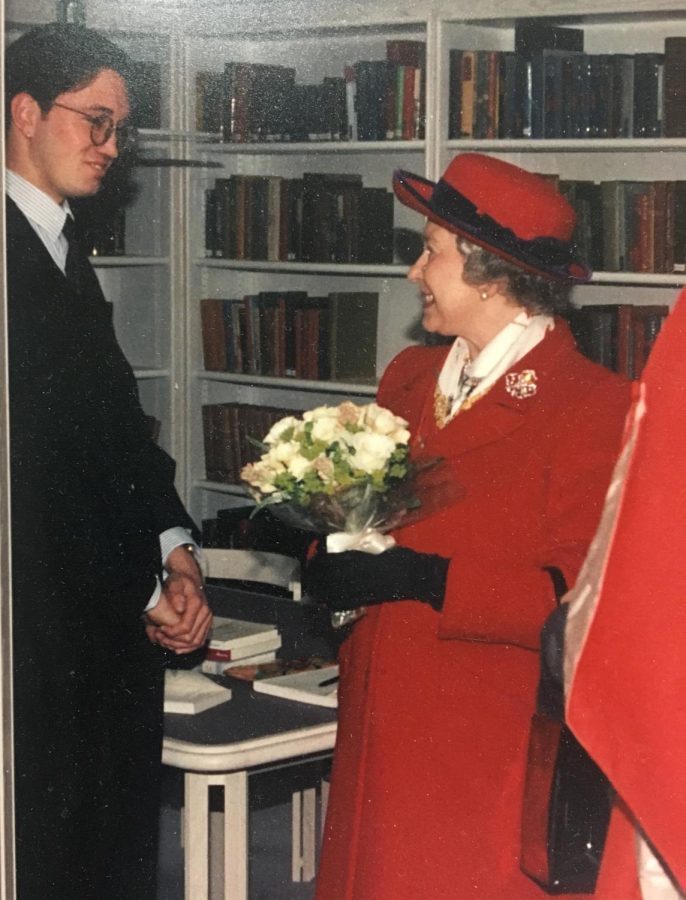Long Lived the Queen
Queen Elizabeth II’s death leaves citizens mourning, reflecting, and wondering what’s next
Dr. David Moseley had the opportunity to meet Queen Elizabeth II when she opened a library at his college. When asked whether he liked the choir performing at that moment, he responded that “it’s a library, I think I’m going to tell them to shut up,” which received a laugh from the then-monarch.
Queen Elizabeth II worked with 15 prime ministers, met 13 US presidents, and owned upwards of 30 corgis. She lived through wars and pandemics, technological advancements and social movements. And now, at the age of 96, she has died.
While perhaps not the most surprising news, the late queen’s death was an emotional—and historical—event, the effects and repercussions of which will be felt the world over. With a newly appointed prime minister and king, England will no doubt be subject to dramatic changes, but those adjustments might not be confined to the one country; changes in leadership will offer other nations to reevaluate their place within the British Commonwealth.
Before any substantial changes can be made, though, a few matters still have to be dealt with, not least of which is the late queen’s funeral, which took place on Monday, September 19. In the four days leading up to it, the coffin will lie in state in Westminster Hall, where hundreds of thousands of mourners are welcome to visit and pay their respects to the monarch. On Monday, the coffin traveled from Westminster Hall to Westminster Abbey, at which point the state funeral service began. This will be followed by a procession through London and the day will be concluded with a private ceremony.
The mourning isn’t restricted just to the public, though; parliamentary business is also being suspended for a 10-day mourning period. This will result in government slowing down, which could have varying effects on Liz Truss, the new prime minister. Anand Menon, professor of European politics and foreign affairs at King’s College London, explained to the LA Times that Truss has “Got to deal with the complication of the funeral and mourning. But on the other hand, she’s got a week or so where she’s not the story, and that would have been inconceivable had this not happened.”
But the funeral isn’t the only complication Truss must deal with—she also must address the increasingly tense political landscape and economic strain caused by Brexit. According to the LA Times, “Economists say the full repercussions of breaking with the bloc, which were masked somewhat by the COVID-19 pandemic, will put an enormous drag on Britain’s finances.” In addition, this separation has increased the tensions between Northern Ireland and the Republic of Ireland (which remains a member of the European Union), as the two share a border. This issue has gone unaddressed by previous prime ministers but remains an important issue.
The Republic of Ireland isn’t the only country thrown into uncertainty by recent news concerning Britain. In fact, Queen Elizabeth’s death has many countries considering cutting ties with the British monarchy. Dr. Will Peters, a History and Social Sciences teacher at Bishop’s, acknowledged that “This is a good opportunity for countries who have the queen appointed as their head of state in some capacity to reconsider whether they want that”; this includes Canada, New Zealand, Australia, Jamaica, and the Solomon Islands, among others. Already, political leaders are calling for change.
Much of the anti-monarchist sentiment stems from anti-colonialism thinking and the expectation that the crown should apologize and atone for imperialism and slavery, which is, unfortunately, what the monarchy represents. “The queen has done things that are morally reprehensible,” commented Dr. Peters, asking “To what extent are you willing to put up with the history and legacy of the monarchy in return for their benefits?”
And while not everything the queen (and the monarchy as a whole) stands for is ethically commendable, there are some upsides, according to Dr. David Moseley, Religion and Ethics teacher. “It [the monarchy] serves a function and purpose,” he acknowledged, adding that it “Is a point for people to unite around and to be somewhat patriotic about.” Mia Gover (‘25) agreed, expressing that “Everyone loves the queen because she’s such a neutral figure” and commenting that she is a “unifying point” for the whole country.
Queen Elizabeth II’s death is sure to have complex ramifications all over the world. But for now, while the public is grieving and government has come to a halt, the queen unifies the country—for a short while, at least.

Lucy is a senior and Lead Content Editor for The Tower. This is her fourth year on the staff and second on the editorial team, and she can’t wait to...







